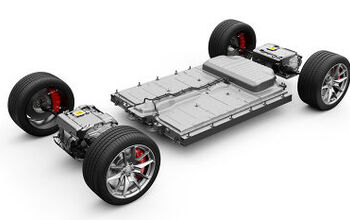Editorial: Pass the Lithium
Lithium-ion batteries are not yet a major source of automotive propulsion. Excluding the li-ion cells lingering within the $100k+ Tesla Roadster, not a single volume vehicle depends on the technology. Toyota has adopted a “go slow” policy on li-on cells re: their gas – electric Synergy Drive (most famously found inside the Prius). Sure, li-ion batteries will power Chevrolet’s electric – gas hybrid Volt. Eventually. And that’s no small point. At the moment, with gas prices at historic low levels, hybrids simply aren’t selling. Of course, nothing’s really selling. Except the idea that we need lots and lots of hybrids and that those hybrids will need lithium ion batteries and we better make sure we have enough lithium otherwise the vision of clean, gas-free personal transportation will disappear. And the New York Times can’t have that, now can it?
Earlier this week, The Times set the autoblogosphere abuzz with a look at Bolivia’s bounteous lithium supply. According to the Times, the United States Geological Survey estimates Bolivia is home to some 5.4m tons of lithium. The U.S. soil supposedly contains “just” 410lk tons of lithium. Ladies and gentlemen of the politically aware persuasion, forget ye olde missile gap. Welcome to the “lithium gap.”
Francisco Quisbert is the leader of a group of salt gatherers and quinoa farmers who live near a giant salt flat. Quisbert’s fifteen minutes of fame arrived when a NYT reporter recorded him pronouncing “we know that Bolivia can become the Saudi Arabia of lithium.” If that wasn’t enough to raise the hackles of the friends of hybrids, Quisbert also played the class card. “We are poor. But we are not stupid peasants. The lithium may be Bolivia’s, but it is also our property.”
Yeah right. Meanwhile, back to the template Times’ readers know and love to hate: western exploitation. The head of Bolivia’s national– yes national– lithium mining company provided the necessary rhetoric. “The previous imperialist model of exploitation of our natural resources will never be repeated in Bolivia. Maybe there could be the possibility of foreigners accepted as minority partners, or better yet, as our clients.”
Bolivia’s President (and former Coca grower) Evo Morales is no stranger to the government-sanctioned expropriation technique commonly known as “nationalization.” Whether sending soldiers into BP’s local headquarters or nationalizing Brazil’s natural gas operations and then charging higher prices, Morales has made it clear that he believes natural resources belong to local indigenous peoples (even if they’re not as well compensated as, say, the Bolivian government and Morales-appointed representatives).
Obviously, lithium commerce predates hybrid hopes. The battery industry has been buying lithium for well over a decade. And Bolivia’s reluctance to grant that industry grant unfettered access to its lithium predates its current leftist president. When right wing nationalists controlled the Bolivian government in the early 90s, advances by the American firm LithCo to secure supplies were thwarted. Unlike the early days of Saudi oil exploration, American firms are on the outside looking in.
The Times reports that Sumitomo, Mitsubishi and a French conglomerate headed by Vincent Bolloré have been trying to wrangle a lithium extraction deal with the Morales government. More recently, Reuters has reported that the Korean firm LG is trying to jump onto the Bolivian lithium bandwagon.
Morales is having none of it. Well, some. The companies’ opportunities are limited to investment in the government operation, which consists of a $6m pilot plant. Construction of a $250m lithium extraction plant is proceding at what The Guardian calls a “snails pace.”
According to Bolivia’s state mining director Freddy Beltran, “there haven’t been any developments (in the negotiations with Mitsubishi, Sumitomo or Bolloré). None of them has made a proposal including (the creation of a lithium) industry.”
Beltran’s kvetch: the three firms all want to export raw lithium. (Why does this sound familiar?) The Bolivian government wants them to develop a processing industry in-country.
Yes, well, the Bolivian government is likely to come to some kind of “arrangement” fairly soon. As one Bolivian economist puts it, “we have the most magnificent lithium reserves on the planet, but if we don’t step into the race now, we will lose this chance. The market will find other solutions for the world’s battery needs.”
Or other lithium supplies. The WSJ’s Environmental Capital blog (and Lithium Abundance blog) points out that increasing demand for lithium would increase exploration, which could turn up new reserves.
What’s more, battery technology is hot (so to speak). With federal funding providing the match. Scientists are hot on the trail of alternative battery materials– from zinc-air to improved nickle-metal-hydrate. Meanwhile, China is pumping out lithium for its own booming battery sector.
In short, despite the NYT geo-political paranoia, anyone worrying about the possibility of a Bolivian lithium embargo is wasting their energy.
More by Edward Niedermeyer
Latest Car Reviews
Read moreLatest Product Reviews
Read moreRecent Comments
- Formula m For the gas versions I like the Honda CRV. Haven’t driven the hybrids yet.
- SCE to AUX All that lift makes for an easy rollover of your $70k truck.
- SCE to AUX My son cross-shopped the RAV4 and Model Y, then bought the Y. To their surprise, they hated the RAV4.
- SCE to AUX I'm already driving the cheap EV (19 Ioniq EV).$30k MSRP in late 2018, $23k after subsidy at lease (no tax hassle)$549/year insurance$40 in electricity to drive 1000 miles/month66k miles, no range lossAffordable 16" tiresVirtually no maintenance expensesHyundai (for example) has dramatically cut prices on their EVs, so you can get a 361-mile Ioniq 6 in the high 30s right now.But ask me if I'd go to the Subaru brand if one was affordable, and the answer is no.
- David Murilee Martin, These Toyota Vans were absolute garbage. As the labor even basic service cost 400% as much as servicing a VW Vanagon or American minivan. A skilled Toyota tech would take about 2.5 hours just to change the air cleaner. Also they also broke often, as they overheated and warped the engine and boiled the automatic transmission...


































Comments
Join the conversation
It's very understandable that the Bolivian government wants the foreign firms to build processing plants there. It's aimed to create/preserve local jobs, something that the Americans are doing everyday (and being discussed on TTAC everyday). And what's wrong with the Bolivian government? Sure, it may imprison or even torture people without a trail. So you call that "dictatorship"? Sounds more like American style anti-terrorism to me.
Oops, I meant "trial", not "trail", in my previous post.